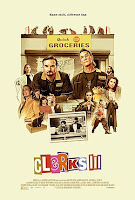By
Scott D. Parker
I watched “Clerks III” on Thursday, and it’s a great example of a storyteller allowing his characters to age, grow, and mature. It’s also an example of a storyteller taking a famous quote he wrote and changing it’s meaning.
“Clerks III” is Kevin Smith’s latest film, coming twenty-eight years after his debut movie, “Clerks.” Being the pop culture geek that I am, folks are surprised to learn that I only started watching Smith’s films 2019. Up until then, he was only a podcaster (and that only since 2012). So, in 2019, leading up to the release of Jay and Silent Bob Reboot, I watched all of Smith’s films, reviewing and ranking them all.
What makes my viewing of these films interesting is that I am in my early fifties rather than the younger person I was had I watched these movies in real time. As a result, they strike me differently (just look at my favorite Smith film). I have a much longer review of “Clerks III” on my own blog, but
I have a much longer review of Clerks III on my own blog, but I want to touch on one aspect here. It’s a storytelling technique I found incredibly brave that yielded an incredibly emotional reward. But to do so, I have to spoil the ending. You’ve been warned.
The Origin of the Famous Quote
A running gag in Clerks was that Dante, one of the two main clerks, came into work on his day off. Played by Brian O'Hallaran, Dante just seemed to sigh and roll his eyes as he had to deal with annoying customers who came looking to buy whatever crap they wanted. To just about everyone, he kept lamenting that “I’m not supposed to be here today.” To all of us who had to work jobs like, boy could we relate.
In Clerks II, it’s one of the closing lines of the movie. As Dante and his best friend, Randal (Jeff Anderson) stand behind the counter of the very same Quick Stop convenience store they now own, Randal says, “You’re not supposed to be here” in an echo from Clerks. Dante replies with “It's the first day of the rest of our lives.”
The Clerks III Version
The main story of the movie is that after Randal has a heart attack, he decides to do something creative with his life and make a move about his life. Basically, he decides to make Clerks. But it’s not all sunshine and rainbows, despite all the in-jokes and winks and nods to the actual movies Clerks and Clerks II.
With the latter two Clerks films, Smith broadened and deepened the love and friendship between Dante and Randal. They are, to use Smith’s term, hetero lifemates. Randal finally realizes how much Dante means to him after Dante himself succumbs to a heart attack. Unlike Randal, however, Dante doesn’t survive.
I’m not sure how many of the folks in my theater were crying when Dante died, but I sure was. Heck, my voice broke a couple of times when I later told my wife the events of the story. Yes, I cry at a lot of things, but these movies and these characters, even over just three years, have come to represent something. I think lots of fiftysomething folks, guys especially, find pieces of themselves in the lives of Dante and Randal.
Now, in Clerks III, at Dante’s funeral, it’s Randal looking down at his friend’s coffin for the last time and he laments that he [Dante] isn’t even supposed to be here [at his own funeral] today.
No one will be able to watch any of the Clerks films—or wear the quote on a t-shirt or see it on a coffee mug—without thinking of how this one simple sentence has had its meaning changed after nearly thirty years.
That’s a fantastic piece of storytelling.


No comments:
Post a Comment